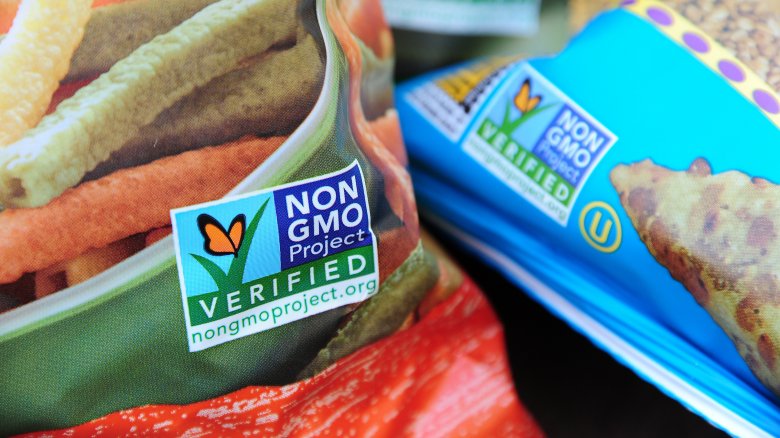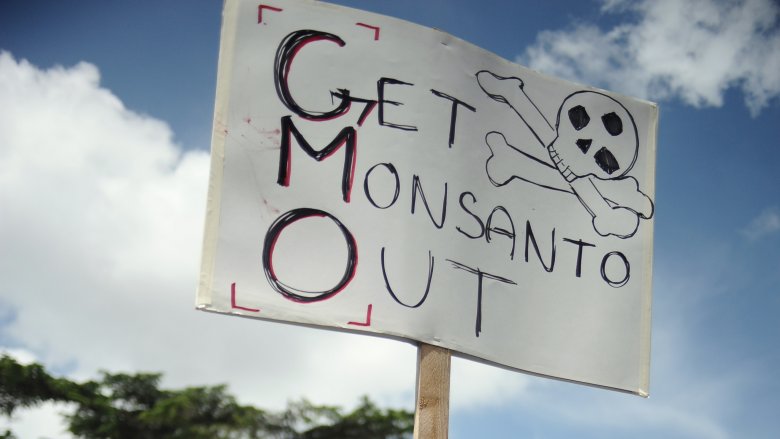The Untold Truth Of GMOs
Of all of the debates currently raging in contemporary American discourse, the argument about genetically modified organisms, specifically foods, is particularly controversial. Opponents of GMOs have a multitude of concerns, ranging from fear that they're carcinogenic to bad for the environment. Other folks worry that we just don't know what potential dangers could be lurking in ears of corn and tomatoes, and argue that it should be disclosed if a food has been genetically modified. But when you dig into the data and examine the facts, you'll find that studies continue to show that the risks of GMOs are minimal, if any at all. So here's what's important to know about GMOs.
GM food is totally safe
In spite of many memes that circulate on social media, ranging from rats with garish tumors to potatoes growing mutant eyes, genetically modified food is totally safe to eat, according to science. For one, GMOs are among the most studied areas of research in the agricultural and biological sciences, which means there is ample data to sift through. Additionally, that data has yet to show that anything about GMOs is risky or dangerous.
People want labels, but they create new problems
Plenty of folks have called for state and federal governments to label any foods or products that contain GMOs. On the surface, it seems harmless enough, but others argue those labels really aren't necessary — especially since a non-GMO label already exists, which allows consumers to select non-GMO food if that's their preferance. Opponents of the labels claim that if GMOs were dangerous, the FDA wouldn't label them — they'd yank them off the market. Additionally, those labels may help to spread fear and misinformation about GMOs, and could also potentially drive up the price of food, which no one wants.
There's no proof GMOs cause cancer
One important concern that GMO opponents have is that GMOs can cause cancer. But there's no evidence that they do, according to Dr. Kevin Folta, a professor at the University of Florida in Gainsville. He told Forbes, "The short answer is no, there is absolutely zero reputable evidence that GMO foods cause cancer." So where does this concern come from? A significant resulted from a study that concluded genetically modified corn caused cancer in rats. However, the study was later retracted — though the panic it caused still remains.
Additionally, a report from the National Academies of Science concluded that GMOs have not caused an increase in cancer rates, as well as many other illnesses it's been blamed for.
Monsanto isn't all bad
Fewer corporations are more maligned than Monsanto, the creators of Roundup Ready crops. They're well-known for formerly manufacturing Agent Orange and DDT. But according to Nina Federoff, a professor at both King Abdullah University of Science of Technology in Saudi Arabia and Penn State University, they've done good things, too. She wrote in Scientific American, "Monsanto and the other big ag-biotech companies have developed reliable, biologically insect-resistant and herbicide-tolerant commodity crops that benefit people, farmers and the environment, and are nutritionally identical to their non-GM counterparts." So for Federoff, the reputation the company has is unfounded.
It goes beyond herbicide resistant crops
For many people, when they think of GMOs, herbicide resistant crops like corn and soy may be the first things that come to mind. But there are a variety of other GMOs. For example, there are GM papayas resistant to ringspots, which have been credited by scientists with saving Hawaii's papaya industry. There are GM mosquitoes that help combat the transmission of dengue fever, which can be life-threatening. And if you love oranges, you'll love that orange trees in Florida have been genetically modified, and can fight off citrus greening.
GM insulin saves lives
According to the CDC, a staggering 30.3 million people in the United States have diabetes — that's 9.4 percent of the entire population of the United States. And because diabetes renders you unable to produce enough insulin naturally, millions of people rely on manufactured insulin to manage their condition, be it type 1 or type 2. So how are so many people able to access the insulin they need? According to the FDA, it's because it's created using genetic engineering, and has been scientifically proven to be safe for humans. Additionally, before GM insulin was made, insulin had to be manufactured using the pancreases of slaughtered animals. And although animal-extracted insulin was effective, scientists say that GMO insulin is safer, more plentiful, and more pure, making it the best option for diabetics everywhere.
GM crops can help the environment
A common concern among GMO skeptics is that GM crops are bad for the environmen. But according to PG Economics Limited, an agricultural consulting company, that's not the case. Rather, their report states that GM crops have helped to significantly reduce greenhouse gas emissions, as well as decrease the amount of pesticide used to grow the same amount of conventional crops. Additionally, the report shows that crop biotechnology has also increased the amount of food produced across the board, and has decreased crop waste due to insects. Additionally, farmers can also grow more crops without needing to purchase additional land, and are seeing their incomes rise in developed and developing countries alike. And it's farmers in developing countries who are seeing the biggest gains, both in crops and money earned.
Golden rice can fight malnutrition
Vitamin A is easy for most Americans to get, either through food consumption or supplements. But for people in more than half of countries around the world, it's not so easy, and vitamin A deficiencies are all too common according to the World Health Organization. Sadly, the people most vulnerable to this deficiency, which can cause blindness, disease, and premature death, are pregnant women and young children in low-income countries. But there are some potential solutions. Enter golden rice, a crop genetically modified to contain enough beta-carotene to provide a child with 60 percent of their daily intake in just one bowl. Unfortunately, according to the scientists at the Golden Rice Project, public skepticism and misinformation about GMOs has made it so many countries who need the crop can't grow it, but they hope that will change in the future.
GMOs are banned in Europe
Even though GM crops are farmed in abundance in the United States, they're banned in Europe. That means they join countries like Russia and Zimbabwe, who've also banned GMO crops. But that doesn't necessarily mean Europe thinks they're unsafe. According to Carel du Marchie Sarvaas, former director of agricultural biotechnology at EuropaBio, the consensus is that GMOs are not a risk. He explained, "European Commission funded-research from 130 projects involving 500 independent research groups over 25 years concluded that, 'There is, as of today, no scientific evidence associating GMOs with higher risks for the environment or for food and feed safety than conventional plants and organisms.'" So the reason GMOs are banned is not scientific, but political, as the approval process requires a vote. He continued, "The EU's official food safety watchdog has consistently upheld its scientific opinions on the products affected by national bans in Europe, repeating that these products are as safe as their conventional counterparts." So it will be interesting to see what happens in the future.
GMO engineering could save oranges
As a Floridian, I keep my ear to the ground when it comes to the Florida citrus industry. I can hear the trains that transport millions of oranges to the rest of the country from my home, and I can smell orange juice in the air when they're processing it. So when I learned that genetic engineering could save Florida's citrus industry, I was heartened, because it's facing serious peril. According to the scientists at GMO Answers, since about 2005, citrus plants have been threatened by citrus greening, which prevents the fruits from ripening and causes them to fall to the ground long before they should be harvested. And it's spread to citrus groves all over the world, killing trees and wreaking havoc on orange orchards. While there are some defenses against transmission already in use, scientists are optimistic that genetic engineering could provide a major solution to this pervasive, potentially devastating disease.










